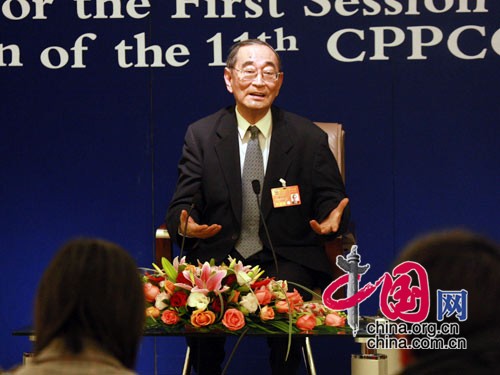Endemic problems signal urgent need for economic reform
- By Wu Jin
 0 Comment(s)
0 Comment(s) Print
Print E-mail China.org.cn, March 7, 2012
E-mail China.org.cn, March 7, 2012
After seven successive years of breakneck growth, China's economy has now entered a period of cooling, with projected growth dropping to 7.5 percent this year, 0.5 percent lower than the minimum eight percent growth see during the previous period.
According to Chinese Premier Wen Jiabao's government report, which was delivered on Monday at the opening of the National People's Congress (NPC), the slight decline in the GDP growth rate is expected to achieve a higher level and higher quality of sustainable development amid the turbulence of the current global economic outlook.
China's exports slid 0.5 percent in January, posting the first decrease in more than two years and sparking mounting concerns over the impact of the global economic meltdown on the world’s second largest economy, gauged by Gross Domestic Product (GDP).
Domestically, the country faces a number of institutional and structural problems, such as unbalanced regional development, the widening income gap and uncoordinated development among different industries, all of which point to an urgent need for economic restructuring.
Commenting on the new growth rate, Li Yining, the renowned Chinese economist who spearheaded the country's reform and opening up, and is now a member of Chinese People's Political Consultative Conference (CPPCC), said: "The 7.5 percent growth rate is appropriate. It doesn't signify less efficient growth than we have seen in previous years. Instead, it's an amelioration of the growth pattern."
|
|
|
Li Yining, a member of Chinese People's Political Consultative Conference (file photo) |
According to the State-owned Assets Supervision and Administration Commission of the State Council (SASAC), the aggregate assets of State-owned enterprises in China totaled 2,800 billion yuan (US$443.5 billion) as of 2011. Meanwhile, net profits reached 91.73 billion, thereby yielding a rate of return, excluding interest and taxes, of around 3.2 percent, about 0.05 percent lower than the banks' one-year benchmark deposit rate. However, the disappointingly low return did not impede the expansion ambitions of State-owned enterprises. Their regional investments snowballed 42-fold in four years, according to a report today in the First Financial Daily.
Commenting on Wen's report, CPPCC member Huang Yan said: "They (State-owned sector companies) are quite inefficient," She also indicated that the situation is made even worse by the fact that the mammoth State-owned sector is disproportionate in size to the country's struggling private sector, which gets a reduced share of the market due to the sluggish overseas market.
In Premier Wen's current report, the country is committed to breaking up monopolies in order to revitalize its private sector, thereby encouraging private investors to venture into railways, public facilities, finance, energy, telecommunications, education and medical care. But in a Xinhua report on Mar. 5, the premier also emphasized that the government will be unflinching in consolidating and developing the public sector.
"We're inspired by Premier Wen's report, but we're still doubtful as to whether or not the government's policy for private enterprises can be effectively implemented," said Huang. The State Council issued 36 regulations in 2010 to encourage private enterprises to invest in certain industries which were previously only accessible to the public sector. But the regulations have met with little success, according to Huang.
"In a market-oriented economy, how much space should we leave for the private sector?" she said. "It would be a shame if the entrepreneurial spirit is smothered by the more cut-throat private sector."
Xu Shanda, Former Vice General Director of the State Administration of Taxation, commented that given the dominant role of the State-owned conglomerates, such enterprises need to share more of their interests with the public.
Having made a long study of macro economy, finance and taxation, Xu commented yesterday at a press conference yesterday held for CPPCC members, including Li, that China should improve its budgetary system so as to ensure a more accurate calculation of State-owned assets and major fiscal problems.
According to Xu and Li, the government's budget accounted for about 35 percent of GDP, which totaled 47,200 billion last year, with pensions and education taking a small slice of the cake.







Go to Forum >>0 Comment(s)